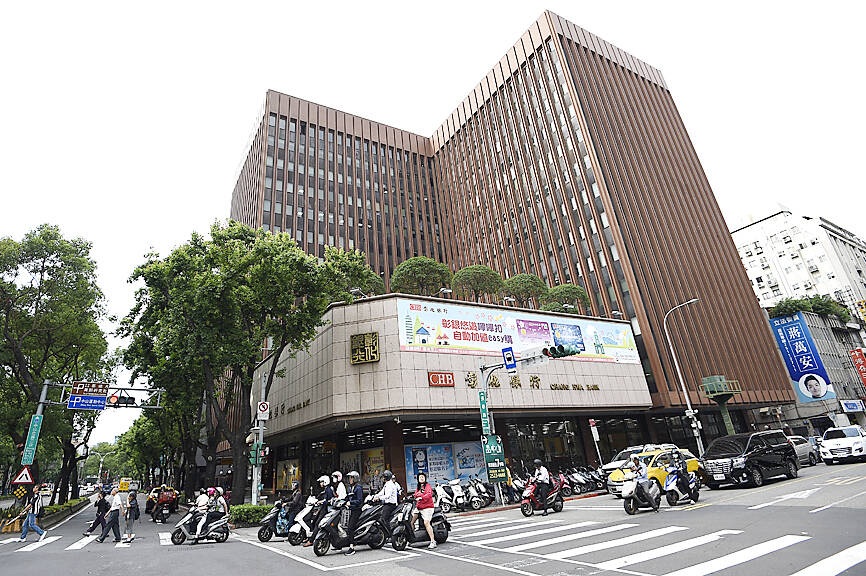State-run Chang Hwa Commercial Bank (CHB, 彰化銀行) said yesterday it is looking at stable profit growth this year on the back of improving loan demand, as exports and private investments come out of the woods after several quarters of inventory adjustments.
“We aim to increase outstanding loans by 3 to 5 percent this year, faster than last year’s 3.9 percent advance,” CHB spokeswoman Wang Shwu-fang (王淑芬) told an investors’ conference in Taipei.
Taiwanese firms would display more interest in capital spending and capacity expansion, as exports steadily emerge from technology product adjustments, Wang said.

Photo: Chen Chih-chu, Taipei Times
The lender reported that net income last year grew 18.33 percent year-on-year to NT$12.98 billion (US$406.95 million), or earnings per share of NT$1.2.
Net interest margin shed 2 basis points to 0.82 percent at the end of last year, as high borrowing costs curbed loan demand.
Taiwan’s interest rate remains quite low compared with that of the US, which is favorable for foreign exchange swaps, a major profit driver in recent years and hopefully in the first half of this year, Wang said.
CHB expects the US Federal Reserve to start cutting interest rates in June to avoid an economic hard landing, she said.
As for investments, the lender said it would raise its stake in US bonds in batches to expand fixed income, and increase holdings in stocks that pay generous cash dividends and support environmental protection and social responsibility.
While focusing on corporate banking, CHB is looking to gain market share in mortgage operations and land financing, it said.
Property development might slow slightly this year, but housing transactions would pick up, buoyed by first-home purchases to take advantage of the government’s interest subsidy, it said.
Developers are likely to slow new project launches and prioritize digesting unsold houses, as authorities have no intention of easing credit controls, CHB said, adding that it would still focus on urban renewal projects this year.
CHB is seeking to boost profit contributions from overseas to 30 percent this year, from 11 percent last year, Wang said.
Its branch in Hong Kong is expected to generate the largest pre-provision income, followed by branches in the US and Singapore, she said.
CHB on Monday opened a new branch in Japan and plans to set up new branches in Canada’s Toronto, Australia’s Sydney and in Southeast Asia, she added.

NEW IDENTITY: Known for its software, India has expanded into hardware, with its semiconductor industry growing from US$38bn in 2023 to US$45bn to US$50bn India on Saturday inaugurated its first semiconductor assembly and test facility, a milestone in the government’s push to reduce dependence on foreign chipmakers and stake a claim in a sector dominated by China. Indian Prime Minister Narendra Modi opened US firm Micron Technology Inc’s semiconductor assembly, test and packaging unit in his home state of Gujarat, hailing the “dawn of a new era” for India’s technology ambitions. “When young Indians look back in the future, they will see this decade as the turning point in our tech future,” Modi told the event, which was broadcast on his YouTube channel. The plant would convert

‘SEISMIC SHIFT’: The researcher forecast there would be about 1.1 billion mobile shipments this year, down from 1.26 billion the prior year and erasing years of gains The global smartphone market is expected to contract 12.9 percent this year due to the unprecedented memorychip shortage, marking “a crisis like no other,” researcher International Data Corp (IDC) said. The new forecast, a dramatic revision down from earlier estimates, gives the latest accounting of the ongoing memory crunch that is affecting every corner of the electronics industry. The demand for advanced memory to power artificial intelligence (AI) tasks has drained global supply until well into next year and jeopardizes the business model of many smartphone makers. IDC forecast about 1.1 billion mobile shipments this year, down from 1.26 billion the prior

People stand in a Pokemon store in Tokyo on Thursday. One of the world highest-grossing franchises is celebrated its 30th anniversary yesterday.

Zimbabwe’s ban on raw lithium exports is forcing Chinese miners to rethink their strategy, speeding up plans to process the metal locally instead of shipping it to China’s vast rechargeable battery industry. The country is Africa’s largest lithium producer and has one of the world’s largest reserves, according to the US Geological Survey (USGS). Zimbabwe already banned the export of lithium ore in 2022 and last year announced it would halt exports of lithium concentrates from January next year. However, on Wednesday it imposed the ban with immediate effect, leaving unclear what the lithium mining sector would do in the